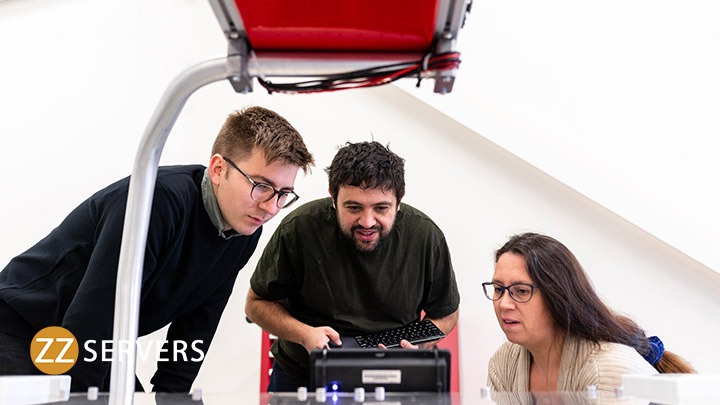Let’s start with a simple overview to answer what information technology and services are directly. Information technology, or IT, refers to all the computer-based tools and systems that help collect, store, share and use data and facts. It includes standard devices like computers, phones and tablets, enterprise systems like networks, databases and custom business applications. It is crucial for powering today’s digital operations in small and large organizations.
In this article, we will look deeper into some core elements of Information Technology infrastructure like hardware, software, networks and cloud computing. We will explore various technical support options, from traditional on-site IT maintenance to modern cloud-based services. By the end, you will comprehensively understand what IT entails and the many career opportunities in this growing industry. Let’s get started!
What is Information Technology?
Let’s look closely at what we mean by information technology. At its core, IT refers to all the digital tools and systems organizations rely on to manage data and power their day-to-day operations. It encompasses hardware, physical computing devices, and software programs and applications.
Hardware is essential to any Information Technology system and includes physical machines like desktop computers, laptops, servers, networking equipment and various handheld devices. Hardware provides the Infrastructure that allows us to process and store data electronically. Some common types of hardware used in businesses are:
● Servers: Powerful computers that host databases and core enterprise systems.
● Networking equipment: Devices like switches, routers and firewalls that securely connect all systems.
● Storage: Hard drives, SSDs and tape/cloud backups to archive information long-term.
Alongside hardware sits software – the programs and coding that enable computers to perform specific functions. Popular business software solutions include operating systems, productivity apps, security programs, databases and custom applications tailored to a company’s unique needs. Microsoft Office, accounting systems and customer relationship management (CRM) tools are examples.
Beyond individual devices and programs, Information Technology also refers to entire computing networks that allow seamless communication and data sharing. Within an organization, this usually consists of local area networks (LANs) securely connecting all PCs, printers and servers. Wide area networks (WANs) and the Internet are used to join remote offices, partners and clients for broader connectivity.
Modern IT systems are only complete with data management capabilities. Databases are at this core, providing structured data storage and query functions. They power back-end operations by organizing everything from financial records to product catalogues. The data processed and stored digitally through these collective IT resources forms the lifeblood of most organizations in today’s digital age.

IT Infrastructure and Devices
Now that we have an overview of IT let’s delve deeper into the infrastructure layer that underpins today’s technology systems. As mentioned earlier, hardware plays a vital role – and a wide variety of devices support modern digital operations.
● Servers: Form the backbone of any network by hosting core business applications and databases. The most common types are file/print servers, email servers, web servers and database servers. Specifications vary depending on the workload, but server hardware is generally more robust with features like RAID storage, redundant power supplies and remote management capabilities.
● Workstations: Employees use individual PCs and laptops to access internal systems and the Internet. These come in different form factors suited to various work styles.
● Desktops offer power, while laptops provide flexibility. Select devices based on your workforce’s daily computing needs.
● Networking Equipment: Includes switches, routers, access points, firewalls and load balancers that securely connect all systems. Properly implemented networks are foundational to allowing seamless collaboration in distributed teams. Invest in high-quality gear from trusted vendors.
● Mobile Devices: Due to the growing remote and fieldwork, smartphones and tablets are increasingly part of the corporate Information Technology landscape. Support a BYOD policy or supply company-owned devices integrated with your network via mobile device management solutions.
● Datacenter: At the core of large infrastructures lies the datacenter – a facility that houses servers, storage and networking in a secure, fault-tolerant environment with redundant power and cooling. Proper maintenance and scaling of these underlying IT assets is vital to running your digital operations smoothly.
Applications and Systems
Now that we’ve covered the basic Infrastructure, let’s discuss the software side of IT – specifically, the systems and applications that run on top of hardware networks to support essential business functions.
These include:
● Operating Systems: Foundational software like Windows, macOS, Linux, etc. that enables devices’ basic operations and interface with hardware. Most servers run server-grade versions like Windows Server or Linux distributions. Workstations typically use desktop OSes.
● Productivity Software: Familiar office suites, email clients and productivity tools that help employees get work done. Some examples are MS Office, G Suite and Slack.
● Custom Applications: Unique software solutions tailored to an organization’s industry and workflows. For instance, accounting systems for businesses or electronic health records for hospitals.

● Customer Relationship Management (CRM) Systems: Salesforce, Microsoft Dynamics and Zoho are leaders in this space. Beyond these core systems, other typical business applications you may come across include content management solutions, security information and event management (SIEM) tools, database management systems and more – all working behind the scenes to keep your operations running smoothly. The proper selection depends on your unique requirements and growth plans. An experienced IT partner can help strategize and implement the optimal technology stack.
Information Technology Services
While setting up and maintaining an IT infrastructure requires substantial resources, only some organizations have a dedicated team. It is where external IT services come in handy. There are various support options available depending on your budget and technical expertise.
● Managed IT Services: An MSP handles all or parts of your IT through remote monitoring and management. It frees your staff for core tasks. Areas they can manage include networks, security, backups and more.
● IT Support & Helpdesk: For quick issue resolution, many firms offer 24/7 phone and ticket-based support. Response times are often guaranteed through Service Level Agreements.
● Cybersecurity Services: With cyber threats rising, it’s wise to enlist security experts for firewall management, vulnerability scanning, employee training and incident response if needed.
● Cloud Computing Services: Moving workloads and data to the cloud can boost agility while reducing hardware costs. Key offerings are Infrastructure as a Service (IaaS), Platform as a Service (PaaS) and Software as a Service (SaaS).
● Data Management Services: These services can help extract insights from your digital assets, from cloud-based data storage and backup to advanced analytics.
● Consulting & Assessment: Experts assess your current state, recommend optimizations and assist with digital transformation strategies involving mobility, AI and more cutting-edge tech.
Whether you need a specialized solution or fully outsourced IT, quality providers deliver measurable business outcomes through reliable, scalable technical support. Do your research to pick a partner aligned with your organizational goals.
Information Technology Careers
With technology playing an ever more critical role in business, there is a growing demand for skilled professionals to manage systems and support digital transformation. Let’s explore some in-demand IT career paths and their typical responsibilities:
● Network Engineers: Design, implement and secure corporate networks, including servers, switches, firewalls and wireless Infrastructure. Troubleshoot connectivity issues and ensure smooth performance. A CCNA or similar certification is expected.
● Systems Administrators: Install, configure and maintain operating systems, applications, databases and backups. Perform system monitoring, security patching and user account management. Degrees in computer science are beneficial.
● Cybersecurity Specialists: Safeguard organizations from cyber threats through security audits, vulnerability testing and training staff on secure practices. A bachelor’s in cybersecurity or CompTIA Security+ certification qualifies candidates for these high-paying roles.
● Cloud Engineers: Oversee cloud infrastructure setup, migration projects and ongoing management of IaaS/PaaS resources on AWS, Azure or GCP. Hands-on experience with major cloud platforms and DevOps methodologies is a plus.
● IT Support/Helpdesk: Act as the first point of contact for any user issues, remotely or on-site.
Troubleshoot hardware/software problems and ensure incidents are resolved smoothly. Certifications like A+ validate core technical skills.
The IT field offers diverse paths for both technical and management roles. With constant evolution, lifelong learning through training and certifications remains essential. Proper planning is critical to building a rewarding career in this vibrant industry.
Take Your IT to the Next Level with ZZ Servers
If you found this information technology and services overview insightful and want to strengthen your organization’s digital capabilities, consider partnering with an experienced managed services provider. For over 17 years, ZZ Servers has skillfully supported small-to-mid-sized companies across various industries with a wide range of customized IT solutions. Whether you need help desk support, security consulting, infrastructure management or cloud migration assistance, our certified experts can develop a tailored strategy to elevate your operations. To discuss how ZZ Servers’ reliable project management and 24/7 monitoring services may benefit your business, contact them today at 800-796-3574 for more details. It’s time to take the first step towards maximizing the value of technology with a trusted advisor.
Frequently Asked Questions
u003cstrongu003eWhat is cloud computing?u003c/strongu003e
Cloud computing allows on-demand access to scalable, configurable computing resources like servers, storage, databases, networking and software via the Internet with pay-as-you-go pricing. This elastic Infrastructure enables greater flexibility and cost-savings than maintaining physical data centres.
u003cstrongu003eWhat does an IT department do?u003c/strongu003e
An IT department oversees all technology operations to ensure smooth business functioning. Key responsibilities include:u003cbru003e● Procuring hardware and software.u003cbru003e● Managing networks and systems.u003cbru003e● Providing user support.u003cbru003e● Implementing security protocols.u003cbru003e● Advising on digital transformation initiatives.u003cbru003eThey act as the backbone supporting modern workplaces.
u003cstrongu003eWhat education and certifications are helpful for IT professionals?u003c/strongu003e
While degrees in computer science, information systems or related fields lay a strong academic foundation, industry-recognized certifications help validate core technical skills for many IT roles. Popular options include CompTIA A+, Network+, Security+, and professional certificates from Cisco, Microsoft, AWS and more, depending on your focus area. Continued learning remains important in this fast-paced field.
u003cstrongu003eWhat are some joint IT support and security services?u003c/strongu003e
Common IT support services involve helpdesk, on-site support, remote monitoring and management to resolve issues and keep systems running. Meanwhile, cybersecurity services like consulting, auditing, training and managed detection/response help safeguard confidential data from evolving threats. Quality providers deliver these solutions through reliable service-level agreements.
u003cstrongu003eWhat is the outlook for IT jobs in the coming years?u003c/strongu003e
According to recent reports, the IT sector is projected to add over a million new jobs in the coming decade, with robust growth anticipated in emerging fields like u003ca class=u0022wpil_keyword_linku0022 href=u0022https://www.zzservers.com/lets-start-talking-about-ai-3u0022 title=u0022artificial intelligenceu0022 data-wpil-keyword-link=u0022linkedu0022u003eartificial intelligenceu003c/au003e, cloud engineering, data analytics and cybersecurity. It underscores the bright career prospects for skilled professionals in this vibrant industry.


